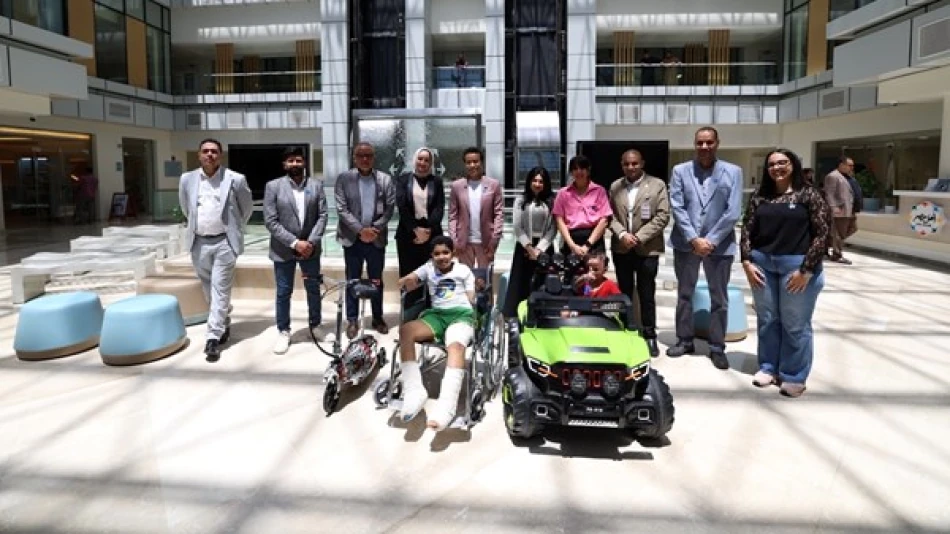
Fulfilling Dreams: 418 Children's Wishes Granted in Year of Community
UAE's "Make-A-Wish" Foundation Fulfills 418 Dreams in First Half of 2025, Expanding Humanitarian Reach Across Four Nations
The UAE's "Tahqiq Omniya" (Make-A-Wish) Foundation has achieved a remarkable milestone by fulfilling 418 wishes for critically ill children in just the first six months of 2025, demonstrating the Emirates' growing soft power influence and commitment to humanitarian leadership across the Middle East. The foundation's expanded reach now spans four countries, reflecting a strategic approach to regional philanthropy that aligns with the UAE's broader diplomatic and cultural objectives.
Record-Breaking Achievement Signals Institutional Maturity
Sheikha Sheikha bint Saif bin Mohammed Al Nahyan, Chairman of the Board of Trustees of the Make-A-Wish Foundation and wife of Sheikh Dr. Sultan bin Khalifa Al Nahyan, advisor to the UAE President, announced the foundation's success in bringing joy and hope to hundreds of children facing life-threatening illnesses. The achievement represents a significant scaling of operations compared to previous years, suggesting both increased funding capacity and operational efficiency.
The foundation's work gained particular momentum during the UAE's designated "Year of Community," which served as a catalyst for amplifying charitable efforts and reinforcing the nation's commitment to social responsibility. This timing is strategically significant, as it demonstrates how national initiatives can drive measurable humanitarian outcomes.
Geographic Expansion Reflects UAE's Regional Influence
Multi-Country Operations Demonstrate Soft Power Strategy
The foundation's operations now span four countries, with wishes fulfilled across the UAE (231 wishes), Egypt (109 wishes), Jordan (63 wishes), and Yemen (15 wishes). This geographic distribution reveals a calculated approach to regional engagement, particularly notable given the UAE's complex relationships across the Middle East.
The inclusion of Yemen is particularly significant, considering the ongoing humanitarian crisis there. By maintaining operations in Yemen despite challenging conditions, the UAE demonstrates its commitment to transcending political boundaries in humanitarian work—a strategy that enhances its regional standing while providing genuine relief to vulnerable populations.
Cultural Diversity as Operational Strength
The foundation served children from 25 different nationalities, reflecting the UAE's multicultural society and its appeal as a regional hub. This diversity strengthens the foundation's operational model by creating a network effect—families and communities from various backgrounds become stakeholders in the UAE's humanitarian brand.
Wish Categories Reveal Changing Childhood Priorities
The foundation categorized wishes into three main types, providing insight into contemporary childhood desires and cultural trends across the region. Material wishes dominated with 369 requests, including cutting-edge electronics, bicycles, pets (including a falcon, camel, and horse), musical instruments, and gaming equipment.
Travel wishes totaled 48, split between domestic experiences (9 wishes) and international destinations (39 wishes). Domestic preferences included the Museum of the Future, Atlantis hotel with dolphin swimming experiences, Sharjah Safari, Warner Bros. Abu Dhabi, SeaWorld, and Ferrari World—showcasing the UAE's success in building world-class entertainment infrastructure.
International Destinations Signal Global Aspirations
International travel wishes revealed fascinating cultural preferences, spanning Disney destinations in Orlando, Paris, and Tokyo, alongside diverse locations including Manchester, South Korea, Switzerland, Germany, Bosnia, Maldives, Thailand, Moscow, India, and Australia's Great Barrier Reef. Religious travel was represented through Umrah pilgrimage requests.
This geographic spread suggests that even critically ill children in the region maintain global perspectives and aspirations, potentially influenced by digital connectivity and international media exposure.
Strategic Implications for UAE's Humanitarian Diplomacy
The foundation's success represents more than charitable work—it's a sophisticated soft power instrument that enhances the UAE's regional influence while building goodwill across diverse communities. By operating across multiple countries and serving various nationalities, the UAE creates positive associations that transcend political boundaries.
The partnership model involving government and private sector collaboration demonstrates the UAE's systematic approach to scaling humanitarian initiatives. This public-private framework could serve as a template for other Gulf states seeking to expand their regional influence through charitable work.
Measuring Impact Beyond Numbers
While the 418 fulfilled wishes represent quantifiable success, the foundation's broader impact lies in its demonstration of institutional capacity and cultural values. Each wish fulfillment creates ripple effects—grateful families, engaged communities, and enhanced perceptions of UAE generosity and competence.
The foundation's ability to operate effectively across four countries, navigate complex logistics for international travel, and maintain quality standards while scaling operations suggests a mature organizational structure that could expand further across the region.
As the UAE continues positioning itself as a regional leader in humanitarian innovation, the Make-A-Wish Foundation's expanding operations provide a compelling model for how strategic philanthropy can advance both humanitarian goals and national interests simultaneously.
Most Viewed News

 Layla Al Mansoori
Layla Al Mansoori






